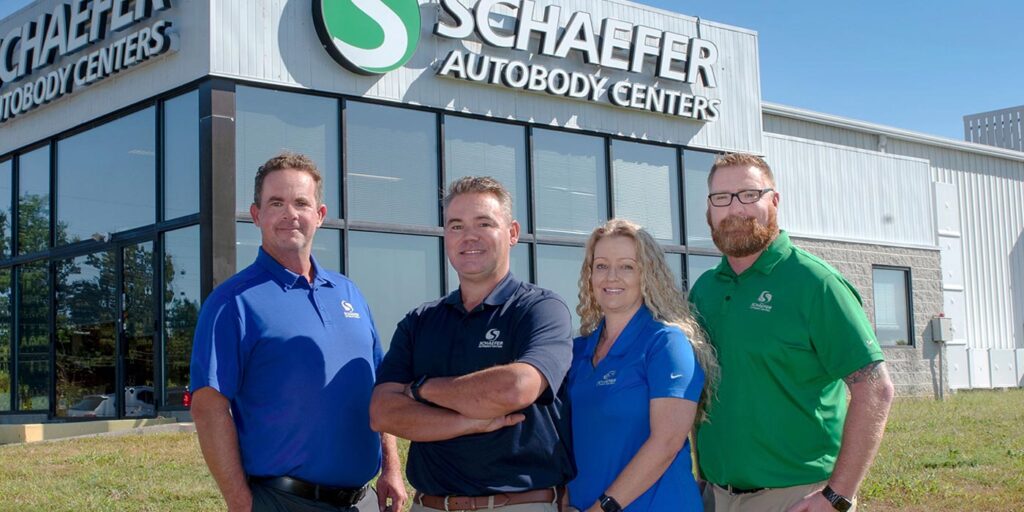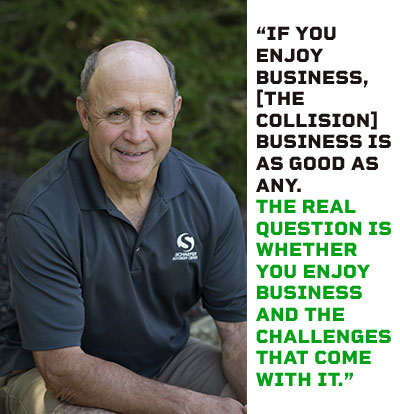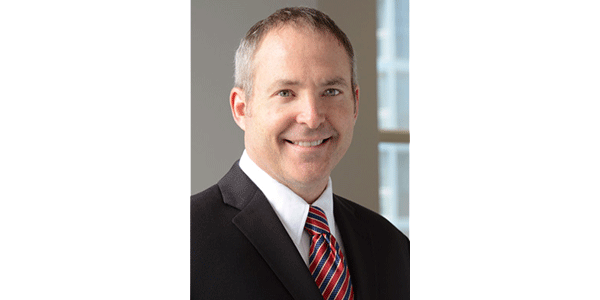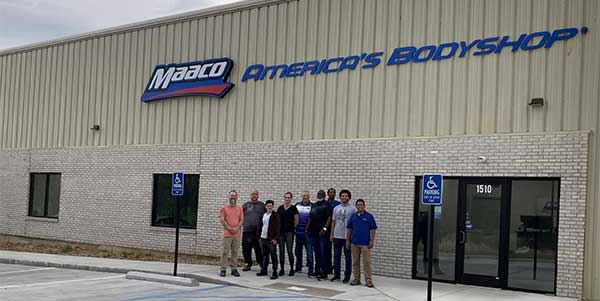Schaefer Autobody Centers was founded in 1985 with one location in Webster Groves, Mo. Steady growth over the years resulted in a business that today includes 12 shop locations plus two dealership satellite locations serving the greater St. Louis area plus Columbia, Mo., and O’Fallon, Ill.
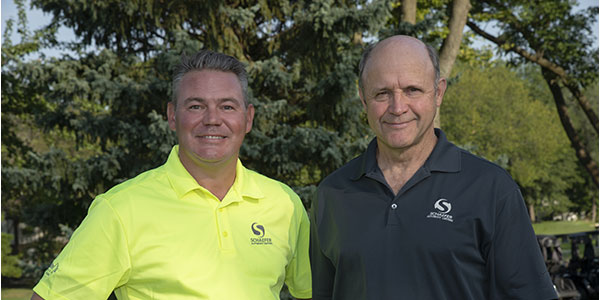
Schaefer’s employees earn well above industry averages. Even so, the shop has not been untouched by the technician shortage.
“We are certainly affected by the ‘tech shortage,’ but that is true in most businesses today, especially in skilled trades,” said Steve Schaefer, vice president of Schaefer Autobody Centers. “We do a lot of advertising and also act on referrals from our own employees. We also work with local trade schools and high schools to attract and educate young people on the opportunities available.
“But retention is even more important than recruitment. People are attracted to stability, growth opportunity and good management. They move when a business falls short in any of these areas, whether it is us or a competitor.”
Schaefer’s customers report satisfaction ratings of 98% and higher. Plus, they have numerous OE certifications and the tools and technology required for proper repairs. Community support involves involvement at BBB leadership, Recycled Rides and donations supporting the St. Louis Children’s Hospital.
Last but not least, Schaefer has a respectful working relationship with most insurance companies.
“We participate in many DRP programs,” said Schaefer. “When the business was started, formal DRP programs did not exist. You relied on your own advertising and reputation to build your business, and I would love it if it was still that way today. However, with 90% of repair dollars being paid by insurance companies and with them moving solidly in the direction of the DRP model, it becomes apparent that if you’re going to serve your customer, business and employees well, you need to move in that direction as well.”
Half of Schaefer’s locations were started from scratch and half were acquisitions of established businesses. All were accomplished without outside investment, allowing Schaefer the freedom to make decisions that continue to positively impact their employees, customers and suppliers, especially during the challenges of 2020.
Three years ago, owner Steve completed the sale of the business to his son, Scott. Steve continues to act as vice president.
“Scott had the opportunity to visit other collision repair businesses before committing to this one, and some of those businesses had a negative view of the industry,” said Steve. “But, to some people, that just cements the desire to win at a bigger challenge.
“All businesses are challenging. If you enjoy business, this business is as good as any. The real question is whether you enjoy business and the challenges that come with it.”
Looking forward, Schaefer’s plan is to continue to carefully add locations both inside and outside of the St. Louis area, including rural areas and neighboring states.
Tough Lessons
Steve achieved success over time, but it was not without learning some tough lessons along the way:
- Hire slowly but fire quickly. Don’t waste your time and put your good people through the misery of having to deal with bad people. And it shows your good people that you care.
- Listen and ask questions. Most people don’t really care about your “position” on things.
- Ignore rumors, in the collision industry and in your personal life. Anyone working to be the best will also be a victim of rumors. Rumors are never firsthand knowledge and are rarely accurate. And it just wastes your time and energy. Spreading negative rumors causes real undeserved damage to others.
- Never let others’ loud voices cause you to damage your own business. Early on in business, I got drawn into meetings where outspoken individuals preached about how unjust the industry was and how we needed to demand more for what we did. Since then, I’ve seen this behavior in many other industries as well. The crazy thing is that later on, you find out that those same people were discounting and doing the things they preached against at the same time.
- Take responsibility for your employees. I would often have trouble sleeping at night because I was stewing over a certain employee’s poor performance or behavior. I eventually learned to fix this by taking responsibility myself. I learned to ask myself two questions: 1. Did the person know what I expected of them? If not, that was my fault and I needed to fix that. 2. Did the person know how to do what I expected? If not, that was my fault and I needed to teach them or get them the appropriate training. If the answers to the first two questions were yes, then it was my fault that I was still putting up with the problem. Once I took responsibility myself, I slept much better because I knew I could fix it the next morning.
- Stick to a pay plan that’s right for you. Many years ago, I got sucked into the idea that paying hourly or salary would result in better control of quality and greater “fairness” in the workplace – an idea promoted by industry experts. However, the result almost ruined my business. People want feedback, and our industry is blessed with many ways to measure productivity and quality. There are still some task areas, such as complex diagnostics, where flat rate or commission doesn’t fit well, but most other areas are now commission-paid in our business. That doesn’t mean everything is always perfect and fair, but most of us understand that – even if we don’t always like it. In the end, the constant measurable feedback creates winners and the personal income that comes with that.
- Appreciate insurers. My years of working in auto repair taught me to appreciate insurance companies, despite the fact that they can be tough and sometimes unreasonable negotiators. When hidden damage arises, we’re able to deal with a bill payer who has the money and also has the experience to know that hidden damage happens. When you’re dealing with a customer whose wallet is going to be impacted by that hidden problem, it’s a whole different story and one that often doesn’t end pretty, no matter how long your business relationship has been with that customer.
One word of advice Schaefer has for collision shop operators considering expanding to more than one location: read the book, “The E-Myth.”
“You need to be on the path toward these shops operating without your daily involvement in each,” he said. “A funny comment from a friend who had just opened his third shop was, ‘Suddenly I realized I can’t be in three places at the same time.’”
Schaefer invites any shop owner considering retirement or a sale of their business to contact him at (314) 378-6809.

